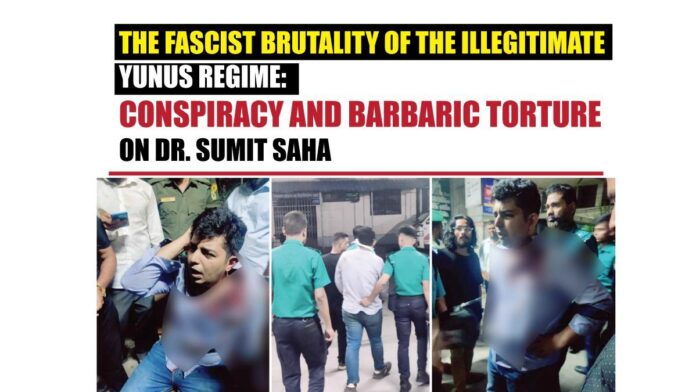The targeted arrest and alleged torture of Dr. Sumit Saha, a prominent physician and health sector organizer, has sent shockwaves through Bangladesh’s civil society. Rights groups and political observers are increasingly raising concerns over what they describe as a systematic campaign of repression under the interim regime led by Muhammad Yunus.
Dr. Saha, who serves as the Health and Population Affairs Secretary of the Cumilla South District Swechchhasebak League, was reportedly assaulted and then detained near Shahbagh, Dhaka, on April 18. His arrest is being widely condemned as politically motivated, and part of a growing pattern of intimidation aimed at silencing professionals and intellectuals who are seen as aligned with the opposition or vocal against the current regime.
According to colleagues and family members, Dr. Saha was first subjected to physical abuse before being implicated in a case widely viewed as fabricated. No prior record of criminal activity or misconduct has been cited against him.
Since the political transition on August 5, Bangladesh has witnessed a dramatic escalation in authoritarian tactics—ranging from mass arrests and disappearances to targeted violence against opposition supporters and civil society actors. Experts warn that the state machinery is increasingly being weaponized to punish dissent and consolidate power, particularly under the guise of maintaining order.
Dr. Saha’s arrest underscores a broader crisis: the shrinking space for civic engagement and the growing vulnerability of professionals, educators, and activists who have historically played a vital role in the country’s democratic and developmental progress.
“This is not just about one man—it is about the kind of country we want to live in,” said one health rights advocate, speaking on condition of anonymity. “When doctors and teachers are treated like criminals for their affiliations, it is the death of public service ethics and professional independence.”
What remains especially alarming to observers is the silence from international institutions that have previously championed human rights and democratic values in South Asia. As attacks on civilians and political workers mount, calls are growing for global actors to reevaluate their support for the Yunus regime and speak out more forcefully against escalating rights abuses.

